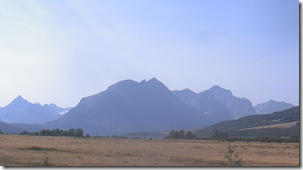Two things were transformative on one particular afternoon in mid-July when, with my dog Mugsy riding shotgun, I drove up from the northern plains past the Great Falls of the Missouri River into Glacier National Park (GNP) experiencing the a spectacular view of the nearly 9,000-foot Red Eagle Peak (as shown in the image with this blog.)
experiencing the a spectacular view of the nearly 9,000-foot Red Eagle Peak (as shown in the image with this blog.)
Growing up in the Rockies I had always entered GNP from the west. Making the approach from the east even more dramatic that afternoon was a program to which I was listening via satellite radio as Mugs laid down and fell back to sleep.
On Being, produced by American Public Media isn’t one of the programs carried back in Durham where I live. One of the nice things about listening to NPR satellite channels is that you get introduced to unfamiliar programs such as this.
The subject that afternoon as I drove up into the shadow of the Rockies was Autism and Humanity and featured an interview by the host Krista Tippett with two authors, Paul Collins and Jennifer Elder, who write about autism but who are also the parents of Morgan, their son who was diagnosed with the condition of autism when he was two and one-half years old.
Click here to read a transcript of that program or you should be able to listen for yourself via one of the links at the top of the transcript or via the player shown at the bottom of this blog.
I don’t think that I heard of autism until sometime in the early 1990s when a friend mentioned that his adopted child might be autistic. While sympathetic, I’m embarrassed that I didn’t stop and ask him more about it at the time. Apparently cases of this neuro-developmental disorder have been diagnosed for a long time, but it wasn’t conceptualized until the mid-1940s, just a few years before I was born. Diagnoses became more widely discussed during the 1980s.
Collins is a college professor and literary historian but in the mid-2000s, a few years after his son was diagnosed, he wrote a book that is part memoir and part biography about people who had the condition throughout history. Not Even Wrong: A Father’s Journey into the Lost History of Autism is on my digital shelf of books to be read.
Jennifer Elder is an author and illustrator. Her book Different Like Me – My Book of Autism Heroes, is written for children between 8 and 12 and is intended to introduce them though an eight year old narrator to famous figures in science, art, math, literature, philosophy and comedy who were thought to be autistic.
The interview is fascinating. Collins and Elder see autism as a spectrum and during the interview they discuss a study of professions common among people at the ends of the spectrum. Listening to this program gave me not only a better understanding of autism but also a realization that in the very rural Idaho school district where I started school in the 1950s, there were students being mainstreamed who were most likely were autistic.
There was something inspirational about this program as I simultaneously witnessed the incredible power of Glacier National Park and it has crossed my mind many times since then. I hope you read or listen to the interview find it as enlightening and inspirational as I did.
.
3 comments:
They're also human with rights and privileges. We should always remember that so we can avoid discrimination.
corporate gift baskets
They also have to be considered even with the condition. There needs to be proper assessment of their rights.
Further study will have to prove whether there's a connection. The medical condition has different implications.
Post a Comment